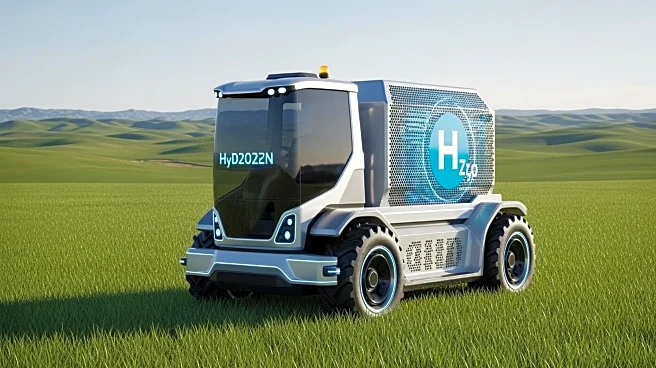What's Happening?
Kubota has introduced a hydrogen-powered, self-driving tractor at the World Expo 2025 in Osaka, Japan. This innovative machine is designed to address labor shortages and promote sustainable farming practices.
The tractor features a 100-horsepower hydrogen fuel cell stack, providing 12 hours of operation per refueling without CO2 emissions. Its autonomous driving capabilities allow it to operate without a driver, using AI-powered cameras to detect obstacles and ensure safety. The tractor evolved from a previous manned version and uses hydrogen fuel cells to generate electricity, producing only water and heat as byproducts.
Why It's Important?
The introduction of this tractor represents a significant advancement in agricultural technology, offering solutions to pressing challenges such as an aging workforce and environmental impact. By utilizing hydrogen fuel cells, the tractor reduces reliance on fossil fuels and contributes to cleaner air. Its autonomous capabilities enhance efficiency and productivity, potentially transforming farming operations. This development aligns with global efforts to promote sustainable agriculture and reduce carbon footprints, offering economic and environmental benefits to farmers and society.
What's Next?
Kubota plans to continue developing the tractor's practical applications, with potential deployment in various agricultural settings. The focus will be on optimizing the technology for different farming tasks and ensuring reliability in diverse environments. As the tractor becomes available, it could lead to more efficient, eco-friendly, and tech-driven farm operations. The success of this innovation may encourage further investment in hydrogen-powered agricultural machinery and drive advancements in sustainable farming practices.
Beyond the Headlines
The combination of hydrogen power and autonomous technology in agriculture highlights the potential for integrating clean energy solutions with advanced automation. This approach not only addresses immediate challenges but also sets a precedent for future innovations in sustainable farming. The ethical implications of reducing environmental impact while enhancing productivity underscore the importance of balancing technological progress with ecological responsibility.










